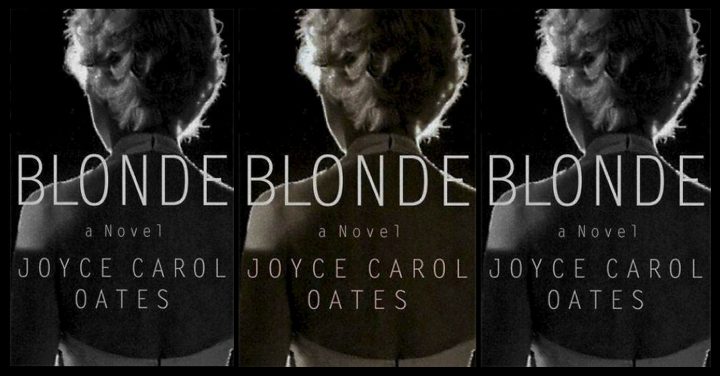REFLEXIONS: READING IN THE PRESENT TENSE
Blaming Blonde

Locked down, locked in, many of us have had time to read more books than ever before. Readers, passionate about their own favourite books, are curious to know what writers have been reading during this bleak and lonely period. What was already on their shelves, what did they borrow and what did they buy or read online? In this series, 'Reflexions: Reading in the present tense', established and younger writers and other creative artists will reflect on a text that moved them, intellectually engaged them, frightened them or made them laugh. Our reviewer today is Jemma Kahn who considers Blonde by Joyce Carol Oates.
Our friends Mike and Timmy were packing their flat in St Martini Gardens with the intention of emigrating to Italy (they got as far as McGregor). St Martini Gardens is a desirable block in Cape Town that overlooks the Company’s Garden. Since before I moved to Cape Town, they had lived there and at a reduced rent because (if I remember correctly) they had done their landlord’s dirty work by removing the previous tenant — a junkie who had fucked the interior quite substantially — themselves. My partner and I inherited lots of cool stuff from our departing friends: a gas heater, Pyrex dishes, glass jars with rubber seals, a small but tastefully curated drug and booze stash, a printer that actually works and Blonde by Joyce Carol Oates. I pulled Blonde from a pile of outgoing books, I admit, to fat-shame it. “This is HUGE!” I said, laughing. “It’s brilliant,” said Michael “Take it.”
Blonde, published in 2000 is an obscenely large book. The copy I inherited was the hardcover and if you didn’t know its contents you could mistake it for a bible of Satan or the unabridged encyclopaedia of BDSM published by Taschen. I cannot imagine a paperback version holding together at all.
Blonde is about Marilyn Monroe. It is not a biography, it is fiction, as critics (and Oates to a lesser extent) are at pains to point out. I understand that we are in a global moment when facts are under threat and we must seek the truth and hold it aloft but sorry critics, sorry JCO. I read Blonde as a biography and I think other people do as well. I wanted to believe every hideous thing in that book. It starts with a short prologue: death as a delivery boy hurtling towards Marilyn in 1962. Then the book jumps all the way back to the childhood of Norma Jean Baker and follows her chronologically through 700 pages, ending where it begins, with her death.
Once I started reading Blonde, it held enormous power over me. Even when I wasn’t in the act of reading, the book sat in our bedroom emitting radiation. The book affected my partner too because I would talk about it a lot and it upset me. Of course, there were other deep disturbances in our flat one year ago. Our careers had disappeared. My body was causing trouble. But he and I decided more than once to blame Blonde for our problems and would put the book in a cupboard. When I felt stronger I would take it out again and read, until it became unbearable again and went back into the cupboard. On and on it went till I finished it. 2020 was such a weird year.
The book contains a lot of repetition which I mostly dislike as a style, I think it’s lazy, but in this case, the repetition is interlaced with the substance. Perhaps because the content is so horrible, so prurient, I enjoyed scratching at it again and again like a scab. Or perhaps it was because the book feels like life, especially last year’s life: one did think the same unhealthy things again and again with minimal shifts. One did create a bad circumstance for oneself for what felt like forever.
We all know that Norma Jean Baker was the woman who became Marilyn Monroe. In Blonde this division is not between a woman and her screen persona, the two are entirely different people. Sometimes the story is about Norma and sometimes it’s about Marilyn. Norma Jean, the normal woman, the real person, learns how to become Marilyn as an adolescent. She calls her “The Friend in the Mirror” (it was the studio heads who named the alter-ego Marilyn Monroe. They thought it was the perfect dumb blonde name, Norma never really took to it). Over the years Norma and her beloved make-up artist Whitey sit in trailers and dressing rooms trying to summon Marilyn Monroe, easier in the early days when Marilyn is welcomed as a shield and a force. But as Norma’s life goes down the tubes — rape, loss, abuse — Marilyn becomes less inclined to arrive. It’s legend that the platinum blonde was a nightmare to work with, partly because she was always late onto set. In Blonde this happens because Norma and Whitey need longer and longer to find the friend in the mirror. I think it’s like erectile dysfunction. The more you struggle to get it up, the more impossible it is.
Norma wants to be loved, she wants a baby, she wants to be respected as an actress and she wants people to understand that she is not stupid. None of these desires are fulfilled for very long. She often feels like a failure at femininity, which is ridiculous because Marilyn Monroe is the ultimate female prototype and Oates plays this conflict over and over again. There are abundant reminders of Norma’s animal secretions; sweat and blood that are of woman but unacceptable. And funny how a miscarriage or an abortion is not considered a validating female experience, only a birth. Norma had plenty of the former but none of the latter. When she marries Joe DiMaggio (referred to in the book as “The Ex-Athlete”) Norma tries to be the Italian-American version of a woman. She tries to cook with her mother-in-law but she doesn’t like garlic, she never learned to chop onions and her new Italian family roll their eyes and write her off. Stuck up, stupid, useless. Over and over Norma can’t win.
The book details a litany of men who misuse her. Some, because they giveth and taketh away — a high school teacher, her first agent, her first husband — can be forgiven. They were weak men in the presence of someone extraordinary. At least they loved her. Then there are the other men who provide no love, who are pure savages: the studio agent referred to only as Z and J.F.K who appears and disappears in one slim but terrible chapter. All of the men adore how she looks and relish how stupid she is at the same time. It’s all part of a package for them.
She’s not stupid, of course. And so she grapples with that too — a smart woman who understands that the world needs her, forces her, to be stupid. These are situations felt by every woman, but Norma, or Marilyn rather, is a fantastic vehicle for these conflicts because they can be exacerbated by the size of her cultural presence.
There are only two men characterised as capable of seeing Norma’s brain. Arthur Miller (“The Playwright”) is one, but perhaps I give him too much credit because of my natural predilection toward theatre Jews. The other is Marlon Brando, “The Dark Prince”. In a scene I remember often, Norma returns to her flat where the night before Brando had been raging drunk and misbehaved. She finds that he has left her flat full of white roses and a note that acknowledges that one of them, either him or her, is going to kill themselves one day. He says he sincerely hopes it’s not her. DM/MC/ML
Jemma Kahn grew up in Johannesburg and studied Fine Art and Drama at Wits. Her theatre work is strongly influenced by kamishibai, a Japanese illustrated narrative style. Jemma’s most recent plays include The Borrow Pit (2018) which she presented as the Standard Bank Young Artist for Theatre of that year. Last year she worked with Jane Taylor and Phala Ookeditse Phala on Waiting for Godot, the fruits of which can be seen on The Centre for the Less Good Idea Instagram page. Her debut film Paardebloem (2021) aired earlier this year on KYKNet. Her early kamishibai shows are currently being performed in people’s homes as part of her new initiative Jemma in the House.


















Thanks for this Jemma. Been eternally curious about this one but never got to read it. So true how a novel becomes part of the present tense / context when reading.